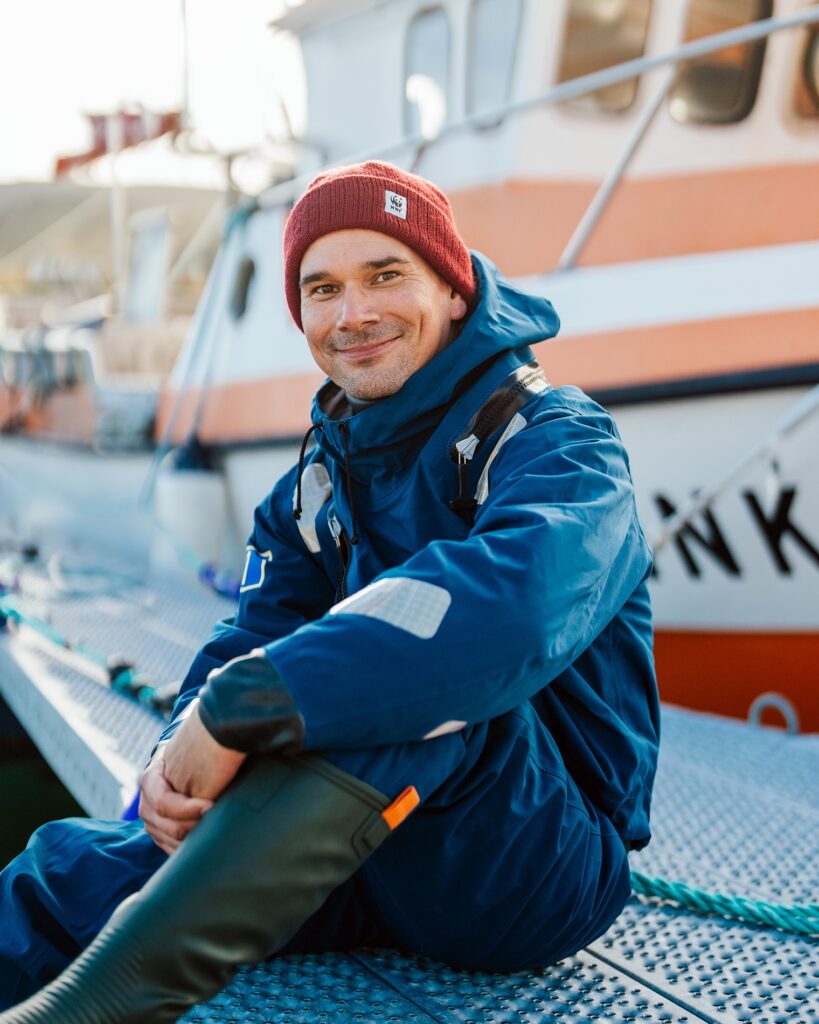Sweden and Finland are the two Baltic sea nations that fish the most herring. They are also the only two nations fishing in the Gulf of Bothnia. But attitudes, research and politics differ regarding the popular fish. In a series of articles BalticWaters investigate the causes to the difference in how the herring fishing is being viewed in Finland and in Sweden.
Why the lack of debate in Finland about the state of the herring? – read how the environmental organizations reasoned
The Council of Ministers’ decision on the 2024 fishing quotas in the Baltic Sea has sparked debate and criticism in Sweden. Among others, WWF Sweden and the Swedish Environmental Party have condemned the continuation of the industrial herring fishing. But on the other side of the Baltic Sea, the topic is not as hotly debated. In Finland a unanimous environmental committee has backed the government’s position regarding continued large-scale fishing, and the attitudes among the environmental organizations also differ from its counterparts in Sweden.
– The Finnish view is based on optimism about the state of the herring, says Tapani Veistola, operations manager at the Finnish Nature Conservancy.
“Finland should actively oppose bans on herring-fishing within the EU”
This was stated by Minister of Agriculture and Forestry Sari Essayah (KD) to the Finnish public service channel Yle at the end of August this year in response to the European Commission’s proposal to put a pause on herring fishing. The proposal caused an outcry among commercial fishermen who warned of a collapse of the industry.
“The Central Confederation of Fisheries Management believes that the EU Commission’s proposal to limit fishing is drastically exaggerated compared to the state of the fish stocks we catch,” the Central Confederation wrote in a press release on August 29.
What followed was an abundance of media reporting, with much of the focus on the threat the proposed ban posed to the industry.
– There have been a lot of interviews with people in the fishing industry who give their view on the matter, how they are affected financially. It is not so much about the fact that the entire stock is facing a collapse and soon we may have nothing to fish at all. That dimension of the conversation is completely missing, says Mikael Sjövall, editor at Finlands Natur and long-time environmental journalist who has followed the herring-situation.
The Finnish government quickly rose to the action in opposition to the EU commissions suggestions and even the environmental committee, where the Green party hold the chairmanship, unanimously followed the government’s line.
“We want the decisions to rely on a scientific basis. There must be a long-term and consistent line of action,” said committee chairman Jenni Pitko (Green) to Hufvudstadsbladet, while referring to the fact they had followed the advice of ICES.
The Finnish Nature Conservation Union was invited to the parliament to be heard on the issue, but operations manager Tapani Veistola tells BalticWaters that it was a hopeless situation to lobby for the Baltic herring.
– We stated that if the disturbances in the herring stock continue, they could lead to even bigger problems in the future. Those changes can in turn have major consequences for the entire food chain. But we could not influence, Finland’s position was locked.
He believes the reason for the Finnish position was the improvement of the state of the herring in Bothnian sea, as recently reported by the Finnish Natural Resources Institute.

Tapani Veistola. Photo: The Finnish Nature Conservation Union
– The Finnish view is based on optimism that this development will continue, says Veistola.
He describes the development that followed the commission’s proposal in August as a “battle between Finland and the EU”.
– There was not much to do. We didn’t comment publicly beyond a few Twitter comments, because we saw that the situation was so hopeless. Of course, we raised concerns when preparing Finland’s position in the government and in the parliamentary hearings, but publicly we did not inform more than with a tweet.
He has been following the discussion in Sweden and says that a similar campaign work for the future of herring does not seem to exist in Finland.
– A couple of years ago, a Swedish colleague called and asked if we had a public discussion about the herring problems, but we don’t.

Matti Ovaska. Photo: Lauri Kalima
Within WWF Finland, however, the herring issue has been more on the forefront. They too were heard by the parliament on the matter and expert Matti Ovaska agrees that the Finnish political position has been difficult to shake.
– I would say that the EU commission’s proposal came as a big shock to Finland. It seems that because of that, Finland had a stronger position on the issue than they might otherwise have.
But he also notes that the criticism of Finland’s stance has not been extensive within the country.
– It seems that stakeholders and many of the researchers did not consider a fishing stop necessary. But in Sweden there has been a different tone.
Although the debate in Finland hasn’t been as heated, Ovaska states that WWF Finland does not find the final fishing quotas to be optimal for the future of herring.
– The quota amounts that were agreed upon are too risky. There is a big jump between zero and 55,000 tons, I would have hoped for more reasonable compromises.
Ovaska stresses that according to the latest stock calculations, the most important stocks in the Baltic Sea have fallen below target levels, which according to WWF Finland is an alarming sign of changes in the Baltic Sea’s ecosystem and food web.
– The reasons for this are a combination of many factors.
But at the same time, he points to the positive signals that Finnish public opinion often leans on, at least when it comes to state of the herring in the Gulf of Bothnia.
– The food supply is better now than before and the herring population in the Gulf of Bothnia seem healthier. That’s what we have gathered from the research. But even if the signals are positive, the situation remains uncertain and therefore we should keep the fishing pressure very low to allow the stocks to grow again.
He was in Sweden when the Council of Ministers’ decision became public, when WWF Sweden quickly issued a press release that stated the fishing quotas are a “disaster for the Baltic Sea” and called it a missed opportunity to give the Baltic Sea the opportunity to recover. In Finland it was quieter on the barricades.
– It is probably also a culturally related thing, that now the decision has been made and we must live with it.
WWF Finland has not taken a stance for a stop in fishing for herring, rather they have focused on a reduction in fishing that considers changes in the marine environment.
– The Baltic Sea’s ecosystem is changing rapidly. Species at the beginning of the food chain react quickly to changes in the habitat and, for example, an increase in temperature can cause a chain of changes in the food web. The effects are first seen in plankton, then in species that eat plankton. The herring is an example of a species that is strongly affected by environmental changes.
They also want to see more of the fish going straight to human consumption.
– We have highlighted that small-scale fishing for human consumption must be prioritized.
Today, Finns eat around 430 grams of herring per person per year and 80 percent of the fish used for human consumption is imported. The Finnish government wants to remedy this within the framework of the “climate-friendly food” program launched in 2021. The goal is to get Finns to eat an average of 2.5 portions of fish per week by 2035. They also want to quintuple the use of herring as human food by the same date. Politically, they also emphasize the importance of using domestically caught fish to produce so-called Baltic feed which, according to the Ministry of Social Affairs and Health, “enables sustainable growth in aquaculture without risking the goal of good water status”. Currently, four fifths of the herring landed in Finland goes to the feed industry.
– Fish farming in Finland is dependent on the herring, which also explains why there is such a strong political will to defend the fishing industry.
Some of the feed also goes to the sector that breeds animals for fur, but Ovaska says that there has been a big change in the last ten years regarding the end use of the herring.
– A few years ago, a lot went to the fur farms, and it is of course not sustainable, but not as much is used for that today. New companies are also focusing on making products for human consumption.
But the fishing industry is still largely unsustainable, and Ovaska is calling for reforms.

Use of herring in Filand. Source: Naturresursinstitutet
– We talk a lot about the importance of introducing ecosystem-based fisheries management. One of our main points in the political discussion has been to establish a recovery plan for the herring stocks, which in short means that we should set additional ecosystem-based management goals and a clear timetable for achieving that goal. And then we could set the quotas and other necessary measures accordingly, that is, keep fishing mortality at a moderate level for several years to reach the desired stock status.
From his point of view WWF Finland has good relations with the government and business on the issue.
– The way fisheries management is discussed is very inclusive in Finland.
On the other hand, he sees that it would be important for Sweden and Finland to reach greater consensus on the topic, as there are apparently different perceptions about the state of herring. An example of this is that WWF Finland and WWF Sweden recently issued different recommendations for the herring in the Gulf of Bothnia in their respective fish guides. In Sweden it is listed as red, while in Finland it is marked as yellow.
– Swedish and Finnish researchers should talk more and have a common perspective to ensure a positive development. We need more cooperation.
Konrad Stralka, managing director at BalticWaters, also agrees that there is a need for greater consensus.
– That the countries cooperate and have a consensus on how fishing in the Baltic Sea develops, and how it affects the marine environment and biodiversity, will be of the utmost importance if the negative trend is to be reversed. It is high time that our politicians, civil servants and researchers start talking to each other.

